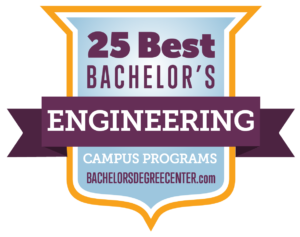
For those who want a career that will continue to promote and move up, engineering offers that ability with experience, certification, and educational degrees. The reason engineering is a diverse and attainable career option is because of the practical skillset that is taught in this major. These skills include logistics, problem-solving, logical thinking, and proficient in working with numbers and are essential for successful engineers across the globe. These students must also be able to be challenged, as these job descriptions will require them to lead and delegate, as well. Some of these students decide to shift their engineering degrees to fit particular engineering technology degree jobs that fit their interests and career goals.
The path to becoming an engineer usually begins with an undergraduate engineering degree — usually a Bachelor of Science in Engineering or a Bachelor of Engineering (BEng). Students who want to work hands-on in the engineering field often choose an Engineering Technology degree. While there are online engineering bachelor’s programs, a traditional, on-campus program is generally considered the best choice, due to the mentorship and networking opportunities — not to mention access to state of the art equipment and labs.
Methodology: Ranking the Best Undergraduate Engineering Schools
The Bachelor’s Degree Center ranking of the best engineering undergraduate schools begins with ABET accreditation, the standard for quality in engineering education. From the initial list of ABET-accredited institutions, we ranked undergraduate programs according to five criteria:
- Cost
- Graduation Rate
- Job Placement Rate
- Salary Potential
- Student Satisfaction
Our data is drawn from IPEDS, College Scorecard, and Niche. With these five factors, students can feel confident that their degree will pay off in their career and salary.
1. Massachusetts Institute of Technology

There’s no question that MIT is one of the best engineering undergraduate schools in the world. MIT’s School of Engineering offers programs in Aeronautics and Astronautics, Chemical Engineering, Electrical Engineering and Computer Science, Mechanical Engineering, Biological Engineering, Civil and Environmental Engineering, Materials Science and Engineering, and Nuclear Science and Engineering. There are even flexible degree options for students who wish to get a little creative with their courses of study.
MIT’s MakerLodge offers first-year engineering students the opportunity to learn useful skills such as shop safety, proper use of hand and power tools, soldering, 3D printing, CNC machining, laser cutting, and circuit board manufacturing. Students can participate in research alongside faculty in state-of-the-art research facilities, including the new MIT.nano nanoscale research facility.
What We Like: All MIT students are eligible to participate in MIT’s Sandbox Innovation Fund, which provides funding to help launch student-run businesses.
Programs: 8 concentrations
Click to learn more about this engineering bachelor’s program!
2. Stanford University

With 16 programs to choose from, Stanford University’s School of Engineering has one of the best engineering degrees in the country. Stanford offers undergraduate engineering degrees in Aeronautics and Astronautics, Chemical Engineering, Bioengineering, Electrical Engineering, Computer Science, Civil Engineering, Environmental Systems Engineering, Materials Science and Engineering, Management Science and Engineering, Mechanical Engineering, Atmosphere and Energy, Engineering Physics, Architectural Design, Biomedical Computation, Biomechanical Engineering, and Product Design.
Stanford Engineering strives to find solutions to problems that impact the entire world and to train leaders who will use engineering to change the world for the better. The school’s goals focus on performing research-based education that is driven by problem-solving and curiosity. Students, faculty, and alumni of the Stanford School of Engineering have founded thousands of companies throughout Silicon Valley and around the world.
What We Like: In addition to the programs listed above, you can major in Energy Resources Engineering through Stanford’s School of Earth, Energy, and Environmental Sciences or design your own major in engineering.
Programs: 16 concentrations
Click to learn more about this engineering bachelor’s program!
3. Duke University

Duke University’s Pratt School of Engineering offers a Bachelor of Science in Engineering (BSE) in Environmental Engineering, Mechanical Engineering, Civil Engineering, Biomedical Engineering, and Electrical & Computer Engineering. The mechanical engineering program is an all-encompassing major that includes study of biotechnology, communication technology, energy, transportation, and nanotechnology. The program emphasizes engineering for the transportation vehicle and aerospace industries.
The faculty at Duke Engineering spends a lot of time thinking about what the engineers of the future will need to know. The school strives to equip its students to think creatively in order to solve the most complex problems in society. Students are immersed in research, design, computing, data science, and entrepreneurship as they work in teams on real-life projects with real clients.
What We Like: Duke Engineering is growing! A new 150,000-square-foot building that is scheduled to open in 2020 will have two full floors dedicated to team-based, real-world problem-solving opportunities.
Programs: BS in Engineering — 5 concentrations
Click to learn more about this engineering bachelor’s program!
4. Georgia Tech

No list of the best engineering undergraduate schools in the world would be complete without the Georgia Tech College of Engineering. Georgia Tech offers undergraduate engineering degree programs in Mechanical Engineering, Biomedical Engineering, Nuclear & Radiological Engineering, Aerospace Engineering, Electrical and Computer Engineering, Materials Science and Engineering, Civil and Environmental Engineering, Industrial and Systems Engineering, and Chemical and Biomolecular Engineering.
Each of the engineering schools within the College of Engineering at Georgia Tech share a focus on communication. Each school’s communication program is led by faculty members who are trained in English, not engineering, and tailored to fit the communication needs for engineers in that discipline. While the teaching methods vary from one school to another, the end result is the same: engineering graduates who are able to communicate well orally, visually, and through the written word. Georgia Tech engineers not only learn how to design a better world, but to explain what they are doing so that everyone else can understand.
What We Like: The Georgia Tech College of Engineering awards more undergraduate engineering degrees to minority and female students than any other engineering school in the US.
Programs: 9 concentrations
Click to learn more about this engineering bachelor’s program!
5. University of Virginia

For students seeking a bachelor of engineering technology, the University of Virginia School of Engineering and Applied Science offers 10 undergraduate engineering degrees to choose from: Chemical Engineering, Electrical Engineering, Systems Engineering, Aerospace Engineering, Computer Engineering, Engineering Science, Biomedical Engineering, Civil Engineering, Computer Science, and Mechanical Engineering. In addition, UVA’s engineering students are given opportunities to take courses in the School of Arts & Sciences and the School of Commerce.
The Works in Progress program at the University of Virginia nurtures student entrepreneurship, and engineering students are encouraged to participate. Students from the School of Engineering and Applied Science have a long history of success in UVA’s biggest entrepreneurship competition.
What We Like: UVA Engineering prides itself on diversity. The school seeks to increase creativity and perspective by including people from many cultures and backgrounds.
Programs: 10 concentrations
Click to learn more about this engineering bachelor’s program!
6. University of Pennsylvania

Founded by Benjamin Franklin himself, the University of Pennsylvania is still highly sought after for one of the best engineering degrees in the US. Penn Engineering offers 10 undergraduate engineering programs: Computer Engineering, Market and Social Systems Engineering, Computer Science, Materials Science and Engineering, Bioengineering, Digital Media Design, Mechanical Engineering and Applied Mechanics, Chemical and Biomolecular Engineering, Electrical Engineering, and Systems Science and Engineering.
Penn Engineering prepares its engineering students to be leaders in technology-rich fields such as bioengineering and computer engineering. Since leadership requires more than just technical knowledge, Penn instills its engineering students with a thorough understanding of teamwork, management skills, ethics, and communication skills. Penn Engineering students work together on collaborative experiences in a research-rich environment.
What We Like: Penn Engineering offers several specialized programs and dual degrees, such as the Roy and Diana Vagelos Integrated Program in Energy Research and the Jerome Fisher Program in Management and Technology.
Programs: BSE or BAS — 10 concentrations
Click to learn more about this engineering bachelor’s program!
7. Princeton University

The School of Engineering and Applied Science at Princeton University offers a Bachelor of Science in Engineering in Computer Science, Operations Research and Financial Engineering, Civil and Environmental Engineering, Electrical Engineering, Chemical & Biological Engineering, and Mechanical and Aerospace Engineering. These programs are all flexible enough for students to pursue certificate programs in other disciplines in addition to the BSE degree.
Princeton Engineering offers a collaborative environment that brings together students from varied academic backgrounds, countries, and cultures to solve the most pressing problems affecting society. Princeton students tackle environmental issues, health challenges, sustainability, and more. Princeton University’s School of Engineering and Applied Science is a world-class school that provides a strong liberal arts foundation along with a solid base in the fundamentals of science.
What We Like: Using their expertise in infrastructure, security, climate, public policy, data science, and other disciplines, Princeton engineers are working to create a resilient and sustainable design for the metropolis of the future.
Programs: BS in Engineering — 6 concentrations
Click to learn more about this engineering bachelor’s program!
8. University of Michigan

Students seeking a bachelor of engineering technology can take their pick from 17 different majors offered through the University of Michigan College of Engineering. The options available are Chemical Engineering, Biomedical Engineering, Aerospace Engineering, Computer Engineering, Climate and Meteorology, Civil Engineering, Electrical Engineering, Data Science, Computer Science, Industrial and Operations Engineering, Environmental Engineering, Engineering Physics, Naval Architecture and Marine Engineering, Mechanical Engineering, Materials Science and Engineering, Space Science and Engineering, and Nuclear Engineering and Radiological Sciences.
Michigan Engineering seeks to provide technological and scientific leadership to improve the quality of life for the people of Michigan and throughout the world. The school values the creation and application of knowledge, as well as the ability to communicate effectively. The school produces strong leaders who will challenge the status quo in order to create a better tomorrow.
What We Like: Michigan Engineering seeks to be daring, innovative, and future-oriented and serve society by focusing on education and research that benefits society.
Programs: 17 concentrations
Click to learn more about this engineering bachelor’s program!
9. Lehigh University

The P.C. Rossin College of Engineering and Applied Science at Lehigh University offers undergraduate engineering degrees in Civil Engineering, Electrical Engineering, Industrial and Systems Engineering, Bioengineering, Computer Engineering, Environmental Engineering, Mechanical Engineering, Chemical Engineering, Computer Science, Engineering Mechanics, and Materials Science and Engineering. Lehigh University is committed to providing opportunities for undergraduate research that is based on finding solutions to real-world problems.
Lehigh’s interdisciplinary program allows engineering students to apply their talents to other fields, such as business, medicine, law, and government. The school offers some of the most flexible engineering programs available anywhere. Lehigh’s interdisciplinary programs include Integrated Business and Engineering; Computer Science and Business; Applied Science; Integrated Degree in Engineering, Arts and Sciences; and Arts and Engineering.
What We Like: Lehigh’s Technical Entrepreneurship program allows teams of students from the business, engineering, and design departments to work together to create new products for the program’s sponsors, including NASA and General Motors.
Programs: BS — 11 concentrations
Click to learn more about this engineering bachelor’s program!
10. Vanderbilt University

The School of Engineering at Vanderbilt University offers undergraduate engineering degrees in Biomedical Engineering, Civil and Environmental Engineering, Mechanical Engineering, Chemical and Biomolecular Engineering, General Engineering, and Electrical Engineering and Computer Science. Students can also minor in engineering management, energy and environmental systems, computer science, materials science and engineering, environmental engineering, scientific computing, and nanoscience and nanotechnology.
The Vanderbilt School of Engineering seeks not just to create revolutions, but to do so responsibly. Students are encouraged to think beyond their scientific and technological training to determine the impact their creations could have on the world, for better or for worse. The school strives to keep students focused on responsibility and sustainability, with a keen eye on the consequences that could be caused by their inventions.
What We Like: Vanderbilt’s School of Engineering works to make the world a better place by improving communication, manufacturing, medical care, entrepreneurship, leadership, and civic engagement.
Programs: 6 concentrations
Click to learn more about this engineering bachelor’s program!
11. University of Illinois

The Grainger College of Engineering at the University of Illinois offers 15 undergraduate engineering majors: Engineering Mechanics; Systems Engineering and Design; Aerospace Engineering; Electrical Engineering; Agricultural and Biological Engineering; Nuclear, Plasma, and Radiological Engineering; Engineering Physics; Bioengineering; Computer Science; Mechanical Engineering; Chemical and Biomolecular Engineering; Computer Engineering; Materials Science and Engineering; Civil and Environmental Engineering; and Industrial Engineering.
Grainger offers scholarships through the Engineering Visionary Scholarship (EVS) Initiative to help make engineering school more affordable. Residents of Illinois are favored in the scholarship selection process. The EVS program offers large scholarships that help attract deserving students to the Grainger College of Engineering. Since the school started offering the EVS scholarships, the number of women and minorities in the freshman class has increased by about 55%.
What We Like: The average starting salary for students who graduate from the Grainger College of Engineering is about 11% higher than the national average.
Programs: 14 concentrations
Click to learn more about this engineering bachelor’s program!
12. Virginia Tech

Virginia Tech’s College of Engineering offers 15 undergraduate engineering majors: Aerospace Engineering, Biomedical Engineering, Computer Engineering, Electrical Engineering, Industrial and Systems Engineering, Mechanical Engineering, Ocean Engineering, Materials Science Engineering, Civil Engineering, Biological Systems Engineering, Chemical Engineering, Computer Science, Engineering Science and Mechanics, Construction Engineering and Management, and Mining and Materials Engineering. The school also offers seven minors.
The College of Engineering at Virginia Tech offers immersive experiences that thoroughly prepare students for whatever comes next in the real world. Students receive a world-class engineering education that provides opportunities to network with professional engineers. First-year students explore all 15 majors in order to be able to make a more informed choice when deciding which engineering major to pursue. The school conducts research in areas such as water contamination, Alzheimer’s disease, and cybersecurity. Students have been recognized for projects such as an improved design for space helmets and a device that helps emergency responders lift patients more easily.
What We Like: The Virginia Tech College of Engineering is #5 in the nation for the number of engineering graduates produced and is ranked 8th in the nation for research expenditures.
Programs: 15 concentrations
Click to learn more about this engineering bachelor’s program!
13. University of Wisconsin

The University of Wisconsin-Madison College of Engineering offers majors in Biomedical Engineering, Electrical and Computer Engineering, Civil and Environmental Engineering, Chemical and Biological Engineering, Industrial and Systems Engineering, Engineering Physics, Biological Systems Engineering, Materials Science and Engineering, and Mechanical Engineering. The school’s world-class faculty deliver a well-rounded curriculum that provides the resources, tools, and knowledge students need to be able to identify problems and design solutions to effectively address them.
The College of Engineering at the University of Wisconsin-Madison offers a hands-on learning environment that engages students in meaningful work that has a positive impact on the world. The school values inclusiveness, and encourages students from different backgrounds to work together in order to benefit from different perspectives. Projects students have worked on recently include making metals malleable, developing technology that allows people to see around corners, and creating smart glass that can recognize images without any circuits or sensors.
What We Like: Internships, volunteer work, student organizations, cooperative work experiences, the TEAM lab, and makerspace all provide opportunities for students to get hands-on engineering experience while they learn.
Programs: 12 concentrations
Click to learn more about this engineering bachelor’s program!
14. Cornell University

The decision to seek the best undergraduate engineering schools will give you an opportunity to focus on accomplishing your long-term goals. Cornell University offers an undergraduate engineering program that gives you the training you need to work in engineering. As one of the best engineering degrees, the program teaches students to apply their training and knowledge about mathematics, science, and engineering to accomplish their goals in a career.
Cornell University stands out from other programs by taking an interdisciplinary approach to engineering. Students gain the opportunity to learn about different aspects of engineering and work together to find realistic solutions to current concerns. Since students from different engineering majors may work together in labs and classes, students are exposed to different areas of engineering while working on their degree.
What We Like: Cornell University offers 14 concentrations in engineering for students to highly in-demand areas like biomedical engineering, earth and atmospheric engineering, and environmental engineering.
Programs: 14 concentrations
Click to learn more about this engineering bachelor’s program!
15. California Institute of Technology

The California Institute of Technology is one of the best engineering undergraduate schools in the world. The engineering program takes an interdisciplinary approach and allows students to work with faculty to develop a customized program to fit their goals. Since students are able to study and investigate topics that are not in a traditional engineering course, they have the chance to focus on addressing unique problems or concerns.
A key way the California Institute of Technology stands out is the way it allows students to customize their studies. Students are not required to follow a set course for their studies. That gives students the flexibility to work around different concerns or learn to address problems that may apply to specific fields of study by using interdisciplinary tools.
What We Like: The California Institute of Technology offers 12 concentrations in engineering and 12 minors that students can use to further enhance their skills within different areas of study.
Programs: 12 concentrations
Click to learn more about this engineering bachelor’s program!
16. Colorado School of Mines

When you want to obtain a bachelor of engineering, the Colorado School of Mines offers a program to help with your long-term goals. The BS in Engineering from the school teaches students leadership and ethics, as well as the technical skills they need to work in an engineering career. By focusing on developing leadership and communication skills, the degree program prepares students for the rigors of a career in the government or a high-level position in a private company.
A key aspect that sets the Colorado School of Mines apart from other programs is the concentrations available to students. The school offers 12 concentrations in engineering that allow students to focus on specific aspects of engineering with a focus that gives them a chance to obtain their career goals. That flexibility to select a degree that fits their plans will help students when they are ready to move forward with a career.
What We Like: The Colorado School of Mines offers 18 athletic teams for students who want to engage in competitive athletics while working on an engineering degree.
Programs: BS in Engineering — 12 concentrations
Click to learn more about this engineering bachelor’s program!
17. UCLA

The University of California at Los Angeles, or UCLA, offers one of the best engineering degrees in the world for students who are planning to work as an engineer. The school gives students a strong foundation in mathematics and science that prepares students for the rigors of working as an engineer or a related career. Students are able to focus on specific areas of engineering to accomplish their goals and address concerns that need real solutions for long-term plans.
UCLA stands apart from other programs by offering 10 concentrations in engineering that range from chemical engineering to mechanical engineering and computer science engineering. The wide array of concentrations and majors allows students to focus on accomplishing their goals for their career. It also gives you the specialized training you need for a specific career path.
What We Like: UCLA allows students to transfer into its engineering programs as long as students have completed their preparatory course work at the lower division of the college.
Programs: 10 concentrations
Click to learn more about this engineering bachelor’s program!
18. Texas A&M University

When you are looking for a bachelor of engineering, Texas A&M University offers a program to help with your long-term goals. The school has one of the best engineering degrees for students who want to study engineering because it offers a variety of degrees that range from undergraduate programs to doctoral-level degrees. That allows students to advance into a higher level of education if they choose to focus on more in-depth studies in the future.
A key aspect that sets Texas A&M University apart is the focus on learning and growing. Students are encouraged to learn about new topics and areas of interest as they work on their degree. That gives students the confidence to pursue an interdisciplinary strategy to resolve complex problems that may need an understanding of multiple topics.
What We Like: Texas A&M University offers more than 20 concentrations in engineering that gives students a strong foundation to focus on their career goals.
Programs: 20+ concentrations
Click to learn more about this engineering bachelor’s program!
19. Rice University

When you are looking for an engineering program that fits your goals, you want to consider Rice University. Rice offers six concentrations in engineering that gives students a strong foundation in basic skills they need to work in engineering. It also focuses on helping students gain confidence in their abilities by offering coursework designed to teach students communication and leadership skills.
A key aspect that sets Rice University apart for engineering is the focus on interdisciplinary skills. While the school only offers six concentrations in engineering, it also allows students to add minors that further support their degree and training. That gives students the flexibility to customize their degree to fit with their goals by adding specific minors that are designed to work with engineering degrees.
What We Like: Rice University is ABET-accredited for its engineering programs, which assures potential employers that students are ready to handle the challenges of a career as an engineer.
Programs: 6 concentrations
Click to learn more about this engineering bachelor’s program!
20. University of Florida

The University of Florida offers the best engineering degrees that are designed to give students a rigorous education and proper training for their career. The school offers students bachelor’s degree programs as well as a higher level of education for those who plan to pursue a degree that fits a specific career or leadership path.
A key aspect that sets the University of Florida apart is the accredited program. The school is ABET-accredited and meets the high standards set for an engineering program. That gives students the confidence to pursue a degree while focusing on career goals. The accreditation means that employers will consider the school relevant for modern engineering practices.
What We Like: The University of Florida offers 13 concentrations for students who plan to pursue engineering.
Programs: 13 concentrations
Click to learn more about this engineering bachelor’s program!
21. Carnegie Mellon University

Carnegie Mellon University is one of the best undergraduate engineering schools for students who plan to work as an engineer. The degree programs focus on preparing students for the challenges of identifying and resolving problems that may arise in different areas of study. It gives students the confidence to look into potential solutions and innovate technology to address a critical concern.
Carnegie Mellon University offers seven concentrations in engineering to give students specialized skills within engineering studies. That allows students to pursue an area of interest while evaluating career opportunities and looking into potential concerns that may arise. The concentrations range from biomedical engineering to mechanical engineering to give students a broad array of topics to study.
What We Like: Carnegie Mellon University offers specialized scholarships for engineering students who may need assistance with the costs of their degree.
Programs: 7 concentrations
Click to learn more about this engineering bachelor’s program!
22. Johns Hopkins University

Students who decide to pursue engineering may find that Johns Hopkins University offers an excellent program for their goals. The undergraduate degree in engineering from Johns Hopkins gives students a strong foundation in the mathematics and science skills they need to address current problems and identifying potential concerns. It also gives students a clear understanding of their area of study and the way engineering works in different industries.
A key way Johns Hopkins University stands apart from other programs is its focus on rigorous and complete studies. Students will have access to a variety of courses to give them a strong foundation in interdisciplinary fields of study before moving forward with a specialized skill set. That gives students the confidence to address problems in their career when they need to draw on skills that are not specific to their area of interest.
What We Like: Johns Hopkins University offers nine concentrations in engineering to give students a variety of options for their degree and goals.
Programs: 9 concentrations
Click to learn more about this engineering bachelor’s program!
23. University of California, Berkeley

The University of California at Berkeley offers an undergraduate program in engineering to prepare students for the challenges of their future career. The degree programs offer the opportunity to take on a career in a technical profession or to follow up on entrepreneurial goals when students want to develop their own company. It gives students a strong foundation in the studies that will help them resolve problems and identify concerns within their area of study.
A critical way the University of California at Berkeley stands out from other programs is the focus on stimulating curiosity. The school strives to encourage students to look into new ideas and pursue personal interests with a focus on answering their questions and satisfying their sense of adventure and curiosity. It gives students the confidence to move forward with their plans by finding new ways to improve life
What We Like: The University of California at Berkeley offers eight concentrations in engineering to give students a variety of options for their career.
Programs: 8 concentrations
Click to learn more about this engineering bachelor’s program!
24. University of Washington

The University of Washington offers one of the best engineering programs for students who want to pursue a career as an engineer. One of the best engineering degrees focuses on giving students a rigorous education that builds on their fundamental knowledge of math and science. It also works on helping students understand the technology associated with engineering and the ways students can use math, science, and technology to find solutions to current problems.
A key way the University of Washington stands out from other programs is the wide array of studies students are allowed to pursue. You can combine your engineering degree with other programs and minors to enhance your understanding of a specific subject or topic of study. That gives you a strong ability to address current problems by using an interdisciplinary approach.
What We Like: The University of Washington offers 11 concentrations in engineering as well as a variety of other majors and minors that you can add to enhance and improve your degree.
Programs: 11 concentrations
Click to learn more about this engineering bachelor’s program!
25. Purdue University

Purdue University offers engineering undergraduate programs that allow students to focus on their goals. The school gives students several options for their career and allows students to pursue a bachelor’s degree, as well as a higher level of education when they are ready for the next step of their career. That flexibility to obtain a degree that fits your plan gives you a chance to pursue an area of interest to address a concern or problem.
Purdue University offers 14 concentrations for engineering students. The number of degree programs allows students to focus on a specific area of engineering or to use an interdisciplinary approach to their studies to address specific concerns. It gives you the flexibility to focus on resolving a problem through innovation and creativity, as well as practical skills.
What We Like: A key way Purdue University stands out from other programs is the online degrees available in engineering. The school offers online courses and masters-level education through their online programs.
Programs: 14 concentrations
Click to learn more about this engineering bachelor’s program!
Is Engineering a Good Career?
The jobs available with an engineering degree are vast and available for students who are looking to enter that career field. Many students may wonder what to do with an engineering degree. In fact, there are several industries in which engineering is instrumental in the daily operations of these industries. This is because of the different skills that are taught and utilized when obtaining an engineering degree. Whether a student is looking into civil engineering, chemical engineering, mechanical engineering, or electrical engineering, the best engineering schools will take their career into a variety of career paths.
The salary for an engineer is another reason why engineering as a career option is often considered. No matter which industry a student is working, if their job title includes engineering, they can expect one of the higher salaries on-site due to the skill set that is required for the job. Types of engineering and salaries can range anywhere from $74,000 annually to well over $98,000 with promotions in several industries.
While the salaries are attractive to these careers, these jobs require more hands-on than other careers and can be more stressful and demanding of the engineer. Type of industries that have engineering technology degree jobs include both the public and the private sectors. These industries require their engineers to take lead on their projects and oversee the success and completion of these projects.
Enrollment in a full-time higher education program in engineering is demanding. U.S. News & World Report names some of the best schools as the University of Texas at Austin, the University of Southern California, the University of Illinois Urbana-Champaign, Purdue University West Lafayette, Northwestern University, and Harvard University.
What Types of Engineering and Salaries are There?
Different types of engineering careers can range in a variety of different industries, and bachelor’s programs offer many such specializations. They can be found every day on the highways, working with electricity, or in a manufacturing plant down the road. Below are some of the different types of engineering careers available.
Some of the more common types of engineering careers include civil engineering which works with infrastructure and roadways across the nation. These engineers can be hired at the local, state, or federal level to operate on public grounds. If an engineer is not interested in working as a consulting civil engineer for an agency, they can work privately for a contracting civil engineer that is often hired by townships for their infrastructure projects. The types of engineering and salaries for civil engineering is on the lower scale of salaries for engineers, but it is still competitive within its industry.
One of the larger types of engineering careers is electrical engineering, which is found at all levels of agencies in every state. Substations and electrical control centers for areas and communities are designs by electrical engineers designed to provide the most power to the area on the grid and maintain a flow of energy that powers thousands of homes daily.
Some focus more on chemical engineering, which takes raw materials in their original state, and engineers them into products that can be used for all citizens while abiding by health and safety guidelines. Aeronautic engineering has a focus on the different aircraft technologies that are utilized for civilians and military uses. This degree requires a specialized degree in order to work with this craft, but it is a career that is both challenging and demanding.
Mechanical engineers are some of the most sought after engineers when considering the different types of engineering careers that exist. These engineers are responsible for the improvement of mechanical operations. They also require extensive skill in leadership, as these engineers are found as leaders of people and finances. For those engineers who have a serving personality, environmental engineering is a growing field that is growing in demand. These engineers are responsible for solving problems such as minimizing pollution and assisting with maintaining the environment in the area.
The types of engineering and salaries that exist vary among the profession, but it is still growing throughout. As industries continue to globalize and technology takes a lead in society and manufacturing, the need for engineers will continue to expand. Graduates from the best colleges may have more connections, but there is more than enough to go around.
Depending on the challenges, demands, and industry of the engineer, they may find themselves at different places on the salary scale. Ranging from the mid $70,000 range to six figures, the types of engineering and salaries increase with experience and promotion. What this means for future students and graduates of engineering and engineering technologies degrees is that there is no limit to their career choices, and they have the ability to take their career in any direction they desire from industry to promotion.
Related Rankings:
15 Best Online Engineering Degree Bachelor’s Programs
10 Fastest Online Engineering Degree Bachelor’s Programs
10 Most Affordable Online Engineering Degree Bachelor Programs
